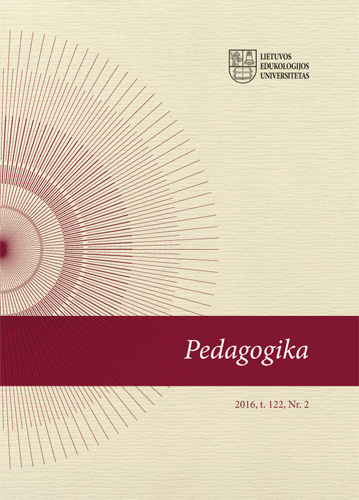Naujosios (Z) kartos mokinių fizikos eksperimentinė veikla: motyvacija ir tarpasmeninė sąveika
The Physics Experimental Activity of New (Z) Generation Students: Motivation and Interpersonal Interaction
Author(s): Palmira Pečiuliauskienė, Džeraldas DagysSubject(s): Education, Social psychology and group interaction
Published by: Vytauto Didžiojo Universitetas
Keywords: the intrinsic motivation for learning physics; interpersonal communication; new (Z) generation;
Summary/Abstract: This paper aims to answer the question how to engage the next generation (Z) students in physics. It examines the basic school student’s intrinsic physics motivation and interpersonal interaction in physics experimental activities. We deal with the problem which physics labs (realor virtual) better promote the motivation for learning physics of students. The theoretical basis of the article comes from the self-determination (Self-determination) theory which allows analyzing the intrinsic motivation in the aspect of interpersonal interaction. The mains conclusions are: 1. The technology develops very quickly in the creative society and the new technological solutions are increasingly adapted in practice activities. In the rapid technological progress an controversial situation is observed – the students’ interest in science decreases, fewer and fewer of them decide to study natural science subjects. Increasing of attractiveness of natural science subjects has become a big problem for policy makers and for educators of natural science subjects teachers. 2. Society is undergoing constant change of generations. New generation (Z) is currently learning at school. This generation is sometimes called “technology generation” however it’s interest in science is low and does not differ from previous generations. 3. Physics experimental activities play an important role in increasing motivation of learning physics. The students of new generation do not only perform the traditional physics experiments but also virtual ones. The students of new generation are engaged in the real physics labs with simple traditional devices. Such physics labs are interesting for students, helps to focus and sustain attention. 4. The students of new generation (Z) are also interested in modern physics labs performed in a virtual space with digital devices. The research discloses that the virtual physics labs were evaluated by lower grades compared to real physics labs for the following features: attractiveness, interest and enjoyment. However, the difference between evaluation of virtual and real physics labs by these features wasn’t statistically significant. 5. The experimental physics activity facilitates interpersonal interaction and communication. The students treats equally the interpersonal interaction in the activities of real and virtual physics labs by the following features: interpersonal distance (I feel really far from this person, I feel close to this person);interpersonal trust (I feel that I really trust this person, I do not feel that I could really trust this person); treatment of friendship (I really doubt that I and this person would be ever friends, If I and this person have the opportunity to interact more we become friends). The smaller interpersonal expectations in the future occurs in real physics labs (I would like to have the opportunity to interact with this person more often; I don’t want to communicate with this person in the future really). The statistically significant difference between the assessment of interpersonal interaction in the real and virtual physics labs wasn’t found.
Journal: Pedagogika
- Issue Year: 122/2016
- Issue No: 2
- Page Range: 110-123
- Page Count: 14
- Language: Lithuanian

